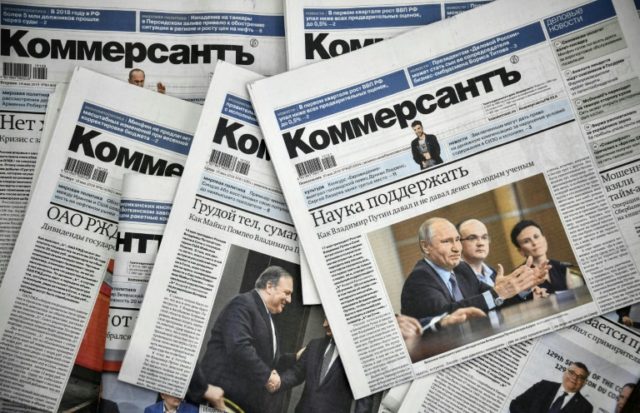Every reporter working for the political section of Russia’s Kommersant daily business newspaper resigned on Monday to show their solidarity with two veteran journalists forced out of their jobs by political pressure.
Over 200 Kommersant employees signed an open letter the same day, denouncing the “obvious clampdown on free speech in Russia.”
The Kommersant crisis began with a story in April that should sound broadly familiar to any consumer of American media: the paper quoted anonymous sources who said a high-level official was secretly planning to resign, but the government disputed and denounced the report as fake news.
In this case, the official in question was Valentina Matviyenko, the senator from St. Petersburg and chairwoman of the Russian Federation Council. Kommersant reporters Maxim Ivanov and Ivan Safronov wrote a story in mid-April predicting Matviyenko will resign and be replaced by Sergei Naryshkin, head of the Russian Foreign Intelligence Service (SVR).
The Kommersant report greatly angered the Kremlin, which refused to comment on the rumors and insisted Matviyenko is still working closely with President Vladimir Putin. The SVR said Naryshkin remains firmly ensconced as director, dismissing rumors to the contrary as “unfounded.”
The controversy went well beyond politicians denying a rumor. Ivanov and Safronov were forced out of their jobs on Monday after ten years with Kommersant, allegedly because the newspaper’s owner, Kremlin-friendly billionaire Alisher Usmanov, was angered by the Matviyenko story and demanded their resignations.
The official line from the editor-in-chief was that “the editorial standards of Kommersant were violated when writing the article,” while Usmanov’s representatives insisted he “does not interfere in editorial policy, let alone make decisions on dismissing or employing journalists.” Usmanov claimed he did not know the two reporters were fired until he read the news like everyone else.
Kommersant staffers, who contended the paper’s editorial procedures were followed and no firm policies were violated by Ivanov and Safronov, soon disputed these claims. Some of these dissenting staffers speculated the editors came to believe the story about Matviyenko resigning was planted by political actors seeking to use the newspaper as a pawn in some elaborate game.
“It’s unacceptable for Kommersant to be used like a waste tank for political infighting. This was about the journalists proving to [Editor-in-Chief Vladimir Zhelonkin] the good faith of their work and that they observed all journalistic standards,” board chairman Ivan Streshinksy said in an interview, bolstering the “planted story” idea.
Safronov, however, made some lively off-the-record comments at his farewell party on Monday that implied he and Ivanov were sacked on Usmanov’s orders as soon as the billionaire returned from a vacation.
Judging from Safronov’s remarks, the two reporters are not entirely certain why their story provoked such anger, but they believe Matviyenko was upset by the implication she was planning to retire – possibly because the rumor jeopardized her chances of landing a plum position at the Russian Pension Fund – and communicated her displeasure to Usmanov.
All eleven journalists working the political desk at Kommersant resigned less than an hour after the firings of Ivanov and Safronov were formally announced. By Monday afternoon, over 200 employees of the newspaper had signed an open letter on Facebook denouncing the terminations as “an example of direct pressure against journalists.”
The Facebook open letter declared Ivanov and Safronov’s controversial article “complied fully with standards at Kommersant, which always draws from reliable and vetted sources.”
“In fact, immediately after the story was published, its authors were awarded bonuses for their reporting,” the letter pointed out.
The letter noted Ivanov and Safronov were fully within their rights under both Russian media laws and their contracts with Kommersant to refuse to disclose their sources. One narrative of their firing holds that Matviyenko is desperate to know who their sources were, so they were told they could keep their jobs if they disclosed those names.
“Kommersant’s staff feels an obligation to notify our readers that Kommersant will, for an indefinite period, be unable to inform them about Russian politics. A forced interruption of this nature has never before occurred in the 30-year history of this publication. We offer readers our apologies,” the letter said.
The letter concluded by imploring readers to make their voices heard before political interference destroyed the venerable newspaper.
“We are confident that Russia deserves a better future. It deserves freedom of speech,” the authors declared.
Freedom of speech groups like Reporters Without Borders (RSF) agreed.
“This editorial meddling in the Kommersant newsroom by the owner is a terrible blow to what is left of journalistic independence in Russia,” RSF said, declaring “total solidarity with journalists who mobilize to defend independent, quality journalism, which is threatened by increasingly blatant political interference.”
Another twist in the story found President Putin’s human rights council appearing to defend Ivanov and Safronov on Tuesday. The council said it was “seriously concerned” by the situation at Kommersant and advised the paper’s owners to “keep from interfering in editorial affairs.”

COMMENTS
Please let us know if you're having issues with commenting.